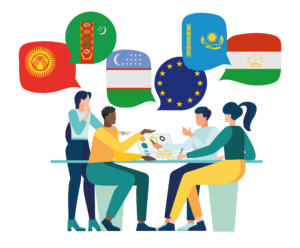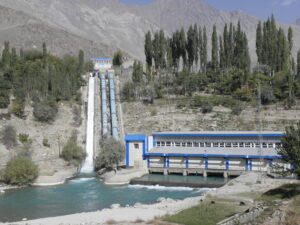Lockdown (dis)connect

Editorial
Narrowing down the digital divide in Central Asian education and civil activism
2020 will go down in history as the ‘lockdown year’ amid the global covid-19 pandemic. Coincidentally, 2020 was also associated with aspirations for achievements in the digital, education, and civil society domains in Central Asia. Uzbekistan proclaimed 2020 as ‘The Year of Science, Education and Digital Economy Development’. In Kyrgyzstan, the year was dedicated to ‘Regional Development, Digitalisation of the Country and Support for Children’, while Kazakhstan focused on good deeds, proclaiming 2020 as ‘The Year of the Volunteer’. The global covid-19 pandemic put these aspirations to a serious test, forcing a rapid shift toward the online domain of all major activities involving human interaction. Among these activities were education, activism, and political campaigning.
All three levels of the digital divide – access, skills, and benefits – are relevant to Central Asia and require scholarly and policy attention. While the rising internet penetration levels are used as indicators of success in the digital domain by some states, it is important to look beyond mere coverage statistics and consider, among other factors, access to electricity, the speed and cost of internet, as well as the nature of device ownership. Indeed, mobile internet penetration may be on the rise, but receiving education or performing certain types of jobs on mobile phones can be a real challenge. For example, hourly electricity blackouts further impact the already shaky connection. Moreover, access is uneven between urban and rural areas. Even in Kyrgyzstan, which boasts of having one of the cheapest internet connections in the world, several areas beyond major cities are disconnected. In terms of skills, the pandemic revealed that digital literacy is an important premise to delivering online education or setting up remote offices or conducting online events. On top of this, going online also entails various cybersecurity risks, such as digital hooliganism, bullying, harassment, theft and dis/misinformation. These digital milieus are further intensifying offline discrepancies, be it economic inequality, gender biases or political power.
As such, the covid-19 pandemic brought to the fore domestic weaknesses and global inequalities in terms of access to knowledge. In some contexts, teachers and students found themselves in dire circumstances, with no technological solutions to organise virtual classrooms. Climbing on trees and sitting on rooftops in the hopes of getting a better connection, relying on expensive and slow mobile internet were the best option for some teachers and students in Uzbekistan, while others did not even have that. In this EUCAM Watch, Madina Ilmiaminova addresses the ‘Achilles’ heel’ in Uzbekistan’s education system that surfaced amid the necessity to deliver knowledge in new, different modes. To make education available in the country’s most remote areas, Uzbekistan’s Ministry of Education opted for both online and television-broadcasted lessons. These approaches were very demanding for teachers, who had to deliver lessons while at the same time restructure courses and learn how to use new tools.
Strict lockdowns also transformed approaches to activism, as public gatherings became restricted. In the new reality, civil society leaders had to seek creative solutions to continue with planned activities. While digital divides are certainly an issue for this domain as well, other risk factors come from the nature of online visibility. In repressive political and conservative social contexts, online visibility may lead to shaming, stigma and, in some cases, severe legal consequences for activists. Yet, there are also opportunities, as online activities allow for connecting thousands of people and spotlighting issues with unprecedented audience coverage, sometimes counted in millions. Balancing between challenges and opportunities is a fine task that was experienced first-hand by Leila Zuleikha Makhmudova, co-founder of the Almaty-based feminist collective FemAgora. In this newsletter, Leila shares lessons learnt from the organisation of a Central Asia-wide online feminist festival. She elaborates on nuances related to resources, outreach practicalities, and security concerns.
With lockdowns in place, people relied on technology, not only for education and work, but also for news consumption and even political campaigning. Amid the new modes of delivering messages directly to followers on social media, without traditional gatekeepers on television, radio or in newspapers, populist politicians took the opportunity to spread their narratives. In Kyrgyzstan, a country that stood out in Central Asia as the home of a vibrant civil society, conservative sentiments are on the rise. Anti-LGBTQ+ and anti-feminist rhetoric is linked to anti-Western sentiments. International partners and donors, which are instrumental for the country’ development processes, are increasingly framed as culturally alien and invasive powers. In response to these processes, Uluk Batyrgaliev concludes this EUCAM Watch by elaborating on online discourses in Kyrgyzstan and the demonising of domestic NGOs and Western partners/international donors amid a populist political rhetoric and a conservative social turn.
Internet penetration rates are important, but online connectivity goes far beyond. When governments announce ambitious digitalisation projects, it is important to consider the multifaceted realities of this domain. Digitalisation is not something that can be achieved as a static telos. Rather, it is an ongoing process, which needs to react to the constantly developing, shifting, and transforming realities. Undoubtedly, the covid-19 pandemic brought major challenges to the already troubled sectors of education, feminist activism, and NGO work. Yet, quite philosophically, these challenges came with a few important lessons. While educators and activists can rely on their inner communities for shared experiences and best practices, putting these lessons into practice is a professional responsibility of decision-makers.
Download “Eucam Watch 24” Watch-24_EUCAM.pdf – Downloaded 431 times – 869.50 KB


![shutterstock_1240181551 [Omgezet]](https://eucentralasia.eu/wp-content/uploads/2024/10/shutterstock_1240181551-Omgezet-300x248.jpg)



